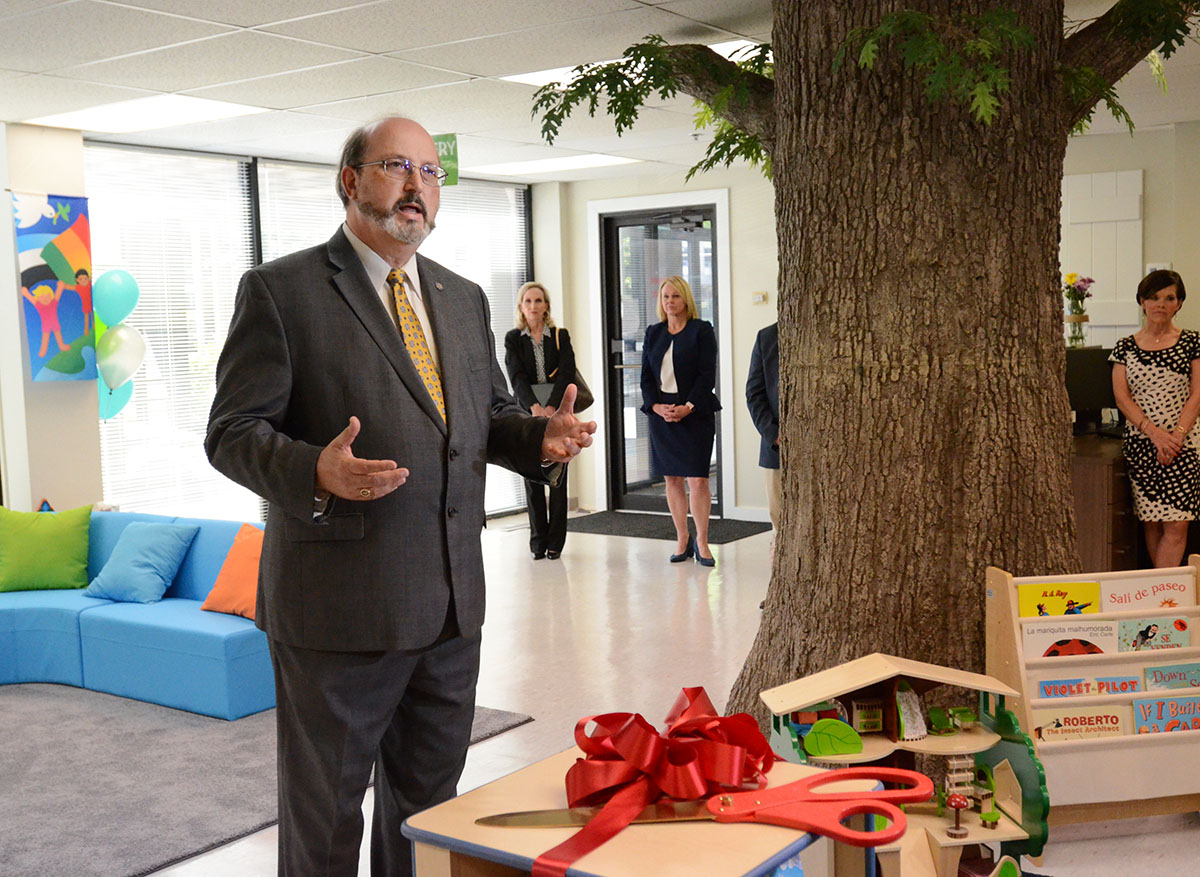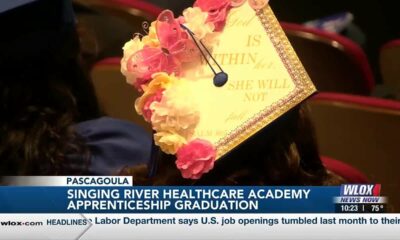Mississippi News
Welfare agency says it can’t ‘take providers by the hand’ to ensure proper spending of $354M in child care funds on tight deadline

Welfare agency says it can’t ‘take providers by the hand’ to ensure proper spending of $354M in child care funds on tight deadline
Private child care providers across Mississippi are scrambling to spend around $150 million, the remainder of their federal stabilization funds, in the next four months.
The centers, which were hit hard by the pandemic as many were forced to stay open while schools closed, may use the large grants broadly on payroll, mortgages and rent, goods like food, classroom equipment, diapers, masks and cleaning supplies, among other expenses.
Though the federal government allows states to spend these child care stabilization funds — $319 million of which it allocated to Mississippi — through September of 2023, the Mississippi Department of Human Services has given child care centers a deadline of September 30, 2022, to expend the funds.
Advocates say the rush might hinder providers from making the best financial decisions for their centers, many of which serve low-income parents and have been cash-strapped for years, resulting in low wages for child care workers.
But centers may also use past operating expenses dating back to the beginning of the pandemic in their reimbursement requests to draw down the funds, called the Child Care Strong grant, in which case they can bank the money and do with it whatever and whenever they wish.
Mississippi Department of Human Services received 1,204 applications for funding and awarded grants to 1,114 centers, over half of which are owned by Black women, MDHS Director Bob Anderson told lawmakers at a Mississippi Democratic Caucus legislative hearing in May.
The Democratic Caucus requested the hearing with MDHS after advocates complained that the agency is not adequately answering questions from providers who want to make sure they spend and record the funds properly so they aren’t hit with demands for repayment — or worse, punishment — next year. The lawmakers said that MDHS has denied requests that it partner with the Mississippi Small Business Development Center program at the University of Mississippi, for example, to help centers with grant accounting.
Anderson told Mississippi Today that any child care provider is free to seek help from the business development center on their own. Asked whether the university’s program has the capability to provide guidance about the specific Child Care Strong grant, he said he didn’t know, but that his agency has provided adequate assistance to its grant recipients.
“Everybody has a perception of whether our technical assistance has been adequate. I think it has been. I don’t think we’ve had a provider that reached out to us that we ignored,” Anderson told Mississippi Today. “Everybody has a different perspective about whether they got enough assistance but I will say, we can’t take every child care provider by the hand and walk them through this grant process and tell them, ‘Yes, you can do A. No, you can’t do B.’ They have to make some business decisions on their own. And that’s beyond the scope of our technical assistance. We’ve laid out the guidelines for how they can use the funds. I mean, that’s on our website.”
Some providers say that MDHS employees who respond to their questions often simply refer them back to the website, which is where their confusion came from in the first place.
“Wherever there’s confusion, there’s misuse, and wherever there’s misuse, there’s jail time,” Rep. John Hines, D-Greenville, said in the hearing. “I don’t want to be part of a system, and none of my colleagues do, want to be part of a system where we set somebody up to fail. If these providers are telling you they’re having some problems with some clarity and some understanding, I’m requesting that you try to resolve those issues so we don’t send somebody to jail arbitrarily. $400,000 is a lot of money. If you got a bad accountant, somebody’s finna to do something wrong.”
An agency spokesperson said that the vast majority of providers are on track with their grant spending and are accurately recording their monthly purchases with the agency — which should prevent any surprises on the back end.
“We validate the fact that there are some concerns,” MDHS communications director Mark Jones said. “We hear our providers, but by in large, we see that 86% or 90% of providers are not having these issues.”
As for the tight deadline, which gives centers nine months at most to spend the grant funds, Anderson explained that it took the agency about a year to close out the accounting for $47 million in “booster shot” grants it awarded to centers in 2020. Anderson said the federal government expects a full accounting of how states spent the stabilization funds by the Sept. 30, 2023, federal deadline. Learning from the past, Anderson said, the agency is giving itself a full year to conduct the paperwork.
“The Sept. 30, 2022, deadline gives you a year to be able to do what you need to do for the federal government. My question is, why is it that the reporting period is longer than the time you’re giving providers?” Rep. Zakiya Summers, D-Jackson, asked in the hearing.
The federal stabilization grants, which Mississippi calls Child Care Strong grants, are intended to provide relief to centers by paying for unexpected business expenses due to the pandemic. The grants are funded by the American Rescue Plan Act signed in March 2021. The state opened up grant applications nine months later in December. MDHS has said it took that long to review guidance from the federal government so it could administer the money within the guidelines. The application period closed at the end of January.
The act also allotted Mississippi nearly $200 million in additional funding for the annual Child Care Development Fund block grant discretionary fund, which may be used to help more low-income children get into child care through vouchers or to improve center quality.
To ensure every center got the amount they were eligible to receive based on a formula MDHS created that mostly accounted for the center’s size, the agency allocated an additional $35 million from the discretionary fund for a total of $354 million in stabilization grants it awarded. Centers received grants ranging from $21,000 to $640,000, which could represent as much as a year’s budget for a center. Through April, MDHS says it has mailed over $158 million in payments to centers.
In a press release MDHS issued Thursday, the agency quoted a child care provider in Hattiesburg, who said, “These funds are providing numerous working parents the assistance to receive free quality childcare in a safe and nurturing environment fostering developmental, academic, social/emotional skills and mental and physical health with qualified and adequate staffing with the proper PPE, support, classroom materials, and environment improvements.”
In the release, Anderson said the agency is also exploring other child care expansion ideas.
“The pandemic has tested the resilience of Mississippi’s child care providers,” he said. “As centers continue to provide services critical to the growth of our workforce and preparation of children for k-12 success, MDHS will work with providers to sustain the industry beyond the current round of Child Care Strong,” he said.
The Child Care Strong grant allows centers to submit reimbursement for expenditures dating back to the beginning of the pandemic in 2020, which advocates say presents a sophisticated accounting exercise for centers who may not have a financial manager on staff. Providers were not permitted to use the money to hire an accountant.
Kassandra Fisher, owner of Agape Love Learning Center in Greenwood, said MDHS’s format for submitting monthly financial reports has changed several times, creating confusion on how the agency wants providers to record their purchases each month.
“They had enough months to have an accurate system where we could have more clarity on how to submit everything. And it seems like we’re trying to learn as we go,” Fisher said. “And providers are already stressed with the time they gave us, the timeframe, we don’t need any more stress.”
Fisher, whose center has received $188,000, has used the money to purchase new equipment and furniture, air purifiers, personal protective equipment, and make building upgrades and repairs. Fisher has been in business 12 years, she said, so many of her classrooms are outdated.
Other providers are worried that if they use the funds on building repairs, contractors might still be working on their centers past the deadline due to delays in construction or items being on backorder. Anderson said in the hearing that work allocated before the September 2022 deadline but not expended until after, such as in the contractor scenario, are permitted, but providers expressed confusion over the explanation, which they say contradicts what they’ve been told.
Suspicion towards the welfare agency from child care providers has lingered during the ongoing fallout of a massive fraud scheme. More than two years ago, the State Auditor’s Office arrested six people, including the former MDHS director John Davis, for taking money from the federal anti-poverty program called Temporary Assistance for Needy Families. Davis continues to maintain his innocence, while the court has delayed his trial several times. Four others who pleaded guilty to several felonies ranging from conspiracy to fraud and bribery have yet to be sentenced to prison as officials continue investigating. Forensic auditors determined the agency and its grantees misspent at least $77 million.
Considering the agency’s recent history, Rep. Hines said it should be doing everything it can to help current grantees follow the rules.
“That agency should be holding those hands to make sure we don’t have the same kind of debacle that took place with the TANF funds,” Hines told Mississippi Today. “They should welcome holding people’s hands to guide them through this process so we don’t be embarrassed like that ever again.”
The agency is attempting to claw back a total of roughly $24 million through a civil suit — though most of the defendants likely do not possess the money to settle or pay on any potential judgements.
The known TANF scheme occurred during 2016-2019, but around the same time, from about 2013-2018, child care providers were screaming about a separate disaster: the department didn’t approve a single new child care voucher from the federal Child Care Development Fund for five years. TANF and CCDF, two federal block grants U.S. Department of Health and Human Services awards to each state’s welfare agency, interact because typically parents receiving TANF automatically receive the voucher, but many more Mississippi parents qualify for the CCDF child care certificate, which has a higher income threshold than TANF.
“With all the fraud that happened, all the years we went through without getting approved a certificate, with parents being on waiting lists, and now we’re finding out why, then I feel like our providers should be compensated,” Fisher said. “All this money they’re talking about they want to regain, going after a lot of people, what about the providers who suffered during that time? What kind of compensation can you offer those providers, you know, for those years that we really struggled and wondered why funding wasn’t there for our children and for the communities that needed it?”
Mississippi Department of Human Services and its auditors have never explained how the agency’s sprawling fraud scheme and misspending of Temporary Assistance for Needy Families funds may have impacted the child care program, and a similar forensic analysis of federal child care funds has not taken place. Today, MDHS says it spends 85% of its CCDF on child care vouchers — the federal government only requires states to spend 75% on certificates — and that the agency does not have a waitlist. But parents still face issues during the application and redetermination, the antiquated process the agency uses to determine parents are still eligible for the benefit.
While the state positions itself and taxpayers as the victim of theft, Fisher thinks about the low-income parents and what they lost because of corruption inside the agency.
“The system failed. They failed the providers. They failed the low-income parents. And we’re talking about funding that’s misused, but what compensation are they going to put in place?” Fisher told Mississippi Today. “What if a parent was trying to finish school and they couldn’t? You know what I’m saying? It’s some years that we struggled real hard.”
“And now you’re rushing us to spend funding that was provided by the federal government, not the state,” she continued. “Then, my thing is, you’re not being fair. You’re not being fair.”
This article first appeared on Mississippi Today and is republished here under a Creative Commons license.
Mississippi News
Events happening this weekend in Mississippi: April 18-20

SUMMARY: This weekend (April 18-20), Mississippi offers a variety of events for all ages. In Jackson, enjoy Food Truck Friday, a jazz concert, free outdoor movie screenings, and multiple exhibitions including “Of Salt and Spirit” and “Hurricane Katrina: Mississippi Remembers.” For family fun, there’s an Easter Egg Hunt at the Ag Museum and “Bunnies & Butterflies” at MCM. Natchez features the Spring Pilgrimage, Lafayette’s 200th anniversary celebration, and a farmers market. In the Pine Belt, highlights include Live at Five, a Spring Candle-Making Workshop, and Easter events at the Hattiesburg Zoo. Don’t miss the Bluff City Block Party and more!
The post Events happening this weekend in Mississippi: April 18-20 appeared first on www.wjtv.com
Mississippi News
Events happening this weekend in Mississippi: April 11-13

SUMMARY: This weekend in Mississippi (April 11-13), enjoy a variety of events across the state. Highlights include the Eudora Welty Birthday Bash in Jackson, Trivia Night at the Mississippi Museum of Natural Science, and Boots & Bling Fundraiser in Natchez. For family fun, check out the Bunny Bonanza in Jackson or the Easter Egg Hunt in Clinton. The Natchez Concours d’Elegance Car Show and Stranger Than Fiction Film Festival offer cultural experiences, while the 12th Annual Dragon Boat Regatta in Ridgeland and the Hub City Classic Car Show in Hattiesburg provide exciting activities for all ages.
The post Events happening this weekend in Mississippi: April 11-13 appeared first on www.wjtv.com
Mississippi News
Ole Miss women get pair of double-doubles and roll to 83-65 March Madness win over Ball State

SUMMARY: Mississippi coach Yolett McPhee-McCuin found solace in returning to a different arena in Waco, Texas, following a disappointing previous tournament experience. The No. 5 seed Ole Miss Rebels redeemed themselves with an 83-65 victory over 12th-seeded Ball State in the NCAA Tournament’s first round. Starr Jacobs led the Rebels with 18 points and 11 rebounds, while Kennedy Todd-Williams and Madison Scott each scored 15 points. Ole Miss dominated rebounding, leading 52-32, and will face fourth-seeded Baylor next. Coach McPhee-McCuin noted the team’s evolution since their last visit and the significance of playing in Texas, where Jacobs feels at home.
The post Ole Miss women get pair of double-doubles and roll to 83-65 March Madness win over Ball State appeared first on www.wjtv.com
-

 News from the South - Alabama News Feed6 days ago
News from the South - Alabama News Feed6 days agoFoley man wins Race to the Finish as Kyle Larson gets first win of 2025 Xfinity Series at Bristol
-

 News from the South - Alabama News Feed7 days ago
News from the South - Alabama News Feed7 days agoFederal appeals court upholds ruling against Alabama panhandling laws
-

 News from the South - Missouri News Feed5 days ago
News from the South - Missouri News Feed5 days agoAbandoned property causing issues in Pine Lawn, neighbor demands action
-

 News from the South - Missouri News Feed3 days ago
News from the South - Missouri News Feed3 days agoDrivers brace for upcoming I-70 construction, slowdowns
-

 News from the South - North Carolina News Feed5 days ago
News from the South - North Carolina News Feed5 days agoFDA warns about fake Ozempic, how to spot it
-

 News from the South - Virginia News Feed5 days ago
News from the South - Virginia News Feed5 days agoLieutenant governor race heats up with early fundraising surge | Virginia
-

 News from the South - Oklahoma News Feed4 days ago
News from the South - Oklahoma News Feed4 days agoThursday April 17, 2025 TIMELINE: Severe storms Friday
-

 News from the South - Arkansas News Feed7 days ago
News from the South - Arkansas News Feed7 days agoTwo dead, 9 injured after shooting at Conway park | What we know


















































